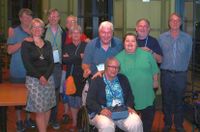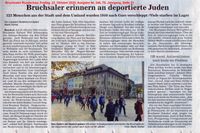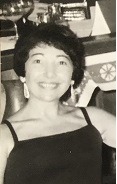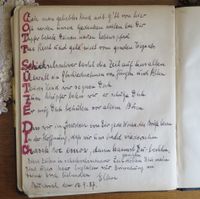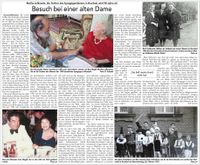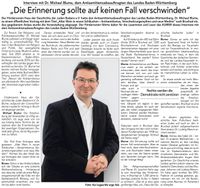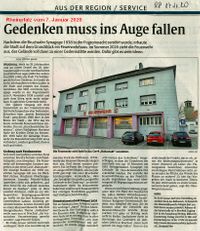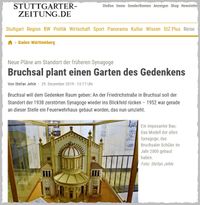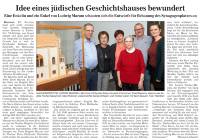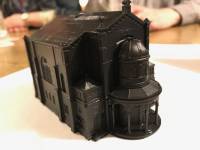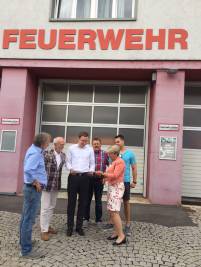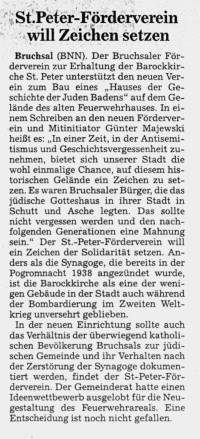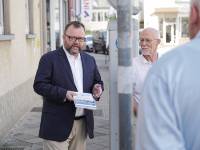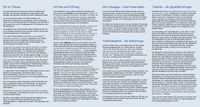On this page you will find the latest information on the progress of the project Haus der Geschichte der Juden Badens. Please keep in mind: The newest articles are above.
A decision is pending after six years of hard work
Bruchsal, July 25th, 2023
I still remember, as I do today, how the phone rang in our hotel room. A call from Germany. On that Tuesday, July 25, 2017, we were at the Hotel Swan Resort in Disney World, Orlando, Florida. I was invited to the 37th JAJGS International Conference on Jewish Genealogy. I was to give a short talk there. On the other end of the phone was Dorit, a good friend from Bruchsal. She told me worriedly that there were efforts in Bruchsal to build a retirement home or a consumer temple on the site of the former Bruchsal synagogue, which had been burned down in the Reichspogromnacht (Night of Broken Glass) in 1938 and whose foundations still lie in the ground. For this purpose, the property was to be sold by the city of Bruchsal to an investor. I felt helpless. So far away from Bruchsal and such a message.
Immediately after my wife Ursula and I returned home, I sat down with friends from Bruchsal and we decided that this should not happen. In order to achieve this, we founded the Förderverein Haus der Geschichte der Juden Badens e.V. (Association for the Promotion of the History of the Jews of Baden).
Since then, many discussions have been held in six years, for example with the Lord Mayor or local councillors, members of the Bundestag and Landtag or representatives of the Jewish religious communities. By means of information booths and many thousands of information flyers distributed in Bruchsal, the city society was sensitized for the topic. Since then, the concerns of the support association have been met with great approval by the people of Bruchsal.
The city initiated an ideas competition for private individuals in 2018 and an ideas competition for architects in 2019. Both competitions produced wonderful ideas for the subsequent use of the synagogue property. Descendants of Bruchsal and Baden Jews but also Holocaust survivors wrote a petition in 2021 advocating for a House of Jewish History and Culture of Baden on the site of the burned synagogue. More than 130 Jewish descendants worldwide signed this petition, made proposals, often in moving words, and with many memories of their ancestors who lived in Bruchsal or Baden.
Now the time has come. The topic „Denkort Fundamente“, as the entire complex to be redesigned is called by the administration, now finds its way to the Bruchsal municipal council in a detailed elaboration of the ideas of the city administration.
This municipal council meeting will be held on Tuesday July 25, 2023. Exactly six years after the phone call with Dorit on Tuesday July 25, 2017.
Retirement home and consumer temple are now off the table. On July 25, 2023, Bruchsal city councilors are to vote on whether the synagogue remains still under the asphalt should be uncovered and presented in a dignified manner. They are to vote on whether the Old Fire Station, built in 1953 on the site of the former place of worship, should remain standing as a memorial. And they are to vote on whether the House of the Jewish History and Culture of Baden will become a reality.
In addition, in the immediate vicinity of the „Denkort Fundamente“ are planned the Bruchsaler city library or the learning place civil courage. This place of learning will focus on the reappraisal of the Nazi history of the city of Bruchsal, but it should also educate about racism and anti-Semitism, expulsion, integration and social coexistence. This is also to be voted on.
It will be exciting to see how the Bruchsal municipal council positions itself. In my personal opinion, gained in many conversations, it understands what needs to be done. I think that the many fellow campaigners, supporters and sympathizers for a dignified treatment of the synagogue property will not be disappointed.
Photos of the Gurs Silence March in Bruchsal on October 22nd, 2020, on the occasion of the 80th anniversary of the expulsion of Jews from Baden and the Saarpfalz to the concentration camp Gurs in southern France.
© Photos: Rolf-Dieter Gerken
Gurs Silence March in Bruchsal on 22 October 2020
On the occasion of the 80th anniversary of the expulsion of Jews from Baden and the Saarpfalz to the concentration camp Gurs in southern France
the association (Förderverein) Haus der Geschichte der Juden in Baden,
the association (Förderverein) Lernort Bergfried-Bruchsal "Freedom - Civil Rights - Democracy" and
the Friedensinitiative (peace initiative) Bruchsal
on 22 October 2020 a GURS silent march through Bruchsal.
This silent march began at 10:00 a.m. at Otto-Oppenheimer-Platz and led across the pedestrian zone, Kaiserstrasse and Friedrichstrasse to the train station area. At the beginning and at the end of the march commemorative ceremonies were held. Lord Mayor Cornelia Petzold-Schick gave a commemorative speech.
Members of the three organizations carried photos of victims of this inhuman action by the Nazi regime in memory of the victims of this deportation. This is to commemorate the people whose children and grandchildren could be members of our urban society today. The deported and mostly murdered people should be given names and a face again. Because of the Corona pandemic, the number of participants was limited to 30.
Call for participation in the silent march and presentation of the village of Gurs and the Gurs concentration camp
TV report of SWR, October 22nd, 2020
English translation of the comment:
It was the place where the Synagogue Bruchsal stood, where the silent march came to a halt for the first time. In a minute of silence the victims were remembered, whose photos most of the participants carried with them.
These are the only remaining film recordings of the deportation in Bruchsal. A total of 85 Jews from Bruchsal had to leave their homeland 80 years earlier today, and more than 6,500 Jews from the entire southwestern part of Germany had to pack their belongings together in no time at all.
The storage halls, which can be seen in the background, are still standing at the back of the train station today.
There we meet Rolf Schmitt, for years he has been fighting against forgetting. His vision is to build a Jewish museum in Bruchsal. He co-organized the silent march. To commemorate the victims is for him a question of respect. To preserve the memory is a duty.
"I think that one must not forget. We had many visits from descendants of the Jewish Bruchsalers and I realized how important it is for these people to keep the memory alive".
These are the pictures of people behind whom there is always a very personal fate. Many of them already lost their lives in Gurs or were murdered in extermination camps in the following years.
The names of the Bruchsal victims were read out loud today.
The story behind the names is to be preserved here in the General State Archive in Karlsruhe [...].
Article in Bruchsaler Rundschau, October 23rd, 2020
Bruchsalers remind of deported Jews
123 people from the town and the surrounding area were deported to Gurs in 1940 / Many died in the camp
From our editorial staff member Marie Orphal
Image caption: Giving the victims a face: With a silent march, the Bruchsalers commemorated the deportation of the Jews to Gurs 80 years ago.
80 years ago, the Jewish population of Bruchsal was forcibly deported to the internment camp in Gurs, France. The events were commemorated with commemoration ceremonies.
Bruchsal. On October 22, 1940, early in the morning, Richard Wolf from Bruchsal was woken from his sleep by Gestapo officials. Ferdinand and Bertha Wolf, the 14-year-old's parents, are also awakened. Within the shortest possible time they are to be ready to travel. A suitcase, a woollen blanket and 100 Reichsmarks: they are not allowed to take much more than that. In front of the house the Wolfs are forced to get into a truck, as an eyewitness reports. The truck drives to the train station, from where they are put on special trains with 120 other Jews and deported to an internment camp in Gurs, France. Small children, old and sick people are also among the deportees. About 80 of them come from Bruchsal, about 40 from the surrounding villages. Some passers-by mock, spit at and insult the victims, others cry - no one helps.
This Thursday marked the 80th anniversary of the deportation of the Bruchsal Jews to Gurs. With a silent march, the both sponsoring associations "Haus der Geschichte der Juden Badens" (Förderverein Haus der Geschichte der Juden Badens), "Lernort Bergfried Bruchsal: Freiheit - Bürgerrechte - Demokratie" and the "Friedensinitiative Bruchsal" (peace initiative) commemorated the events on this occasion. About 50 people marched through the city, wearing portraits of the deportees on their bodies. "We wanted to give the Jews back their name and face," explained Rolf Schmitt, chairman of the sponsoring association Haus der Geschichte der Juden Badens. From Otto-Oppenheimer-Platz the participants walked along Kaiserstrasse and Friedrichstrasse to the site of the old synagogue and from there to Viktoriapark.
According to the organizers, almost the entire Jewish population of Baden, the Palatinate and Saarland was deported to the internment camp "Camp de Gurs" in southern France on October 22, 1940 - more than 6,500 people. The goal of the "Wagner-Bürckel-Aktion" is to make the southwest German territories the first in the Reich to be "free of Jews". On this day the Gestapo forcibly drives Jewish citizens to the train station in Bruchsal. Of the approximately 80 Bruchsal Jews, only 24 survive the time in the internment camp. Some of them already die on the train ride to Gurs, 1,300 kilometers away. In the internment camp, the people live in cold and dirty barracks, sleep on straw sacks or on the floor and feed on coffee grounds and beet soup. Many die due to the poor supply, hygienic conditions, rain and cold already a few weeks after arrival. Others are further deported from Gurs to extermination camps and murdered.
The Bruchsaler Richard Wolf is among those who survived Gurs. He never told much about his time in the internment camp, his daughter Hélène Wolf recalls in a written greeting to the organizers of the silent march. The silence of her father, who died in 1981, had left a "pain" in her family.
Lord Mayor warns: Anti-Semitism still a problem today.
"The deportation made drastically visible what hate, fanaticism, and racial madness can do to terrible things," emphasized Mayor Cornelia Petzold-Schick at the beginning of the silent march. And: "Violence, hate and agitation must have no place in our city and in our country. The deeds of National Socialism should not be forgotten - especially against the background that anti-Semitic crimes are still a problem today: "Every year, between 1,000 and 2,000 anti-Semitic attacks are recorded".
A list of deportees compiled by the Nazis and a one-minute film sequence showing the deportation at Bruchsal station bear witness to the events. In Bad Schönborn, Philippsburg, Untergrombach and Heidelsheim, too, commemorative events were held on Thursday to commemorate the deportation of Jews to Gurs.
The Gurs Silence March. 15 minutes film with some of the speeches in German
Short youtube movie, made in front of the Bruchsal Old Firestation on the Synagogue ground, short before the Gurs Silence March came there.
This short youtube movie led to discussions on facebook. The question was asked, how the Bruchsal will deal with its memory of the Holocaust in the future, if not even the memorial plaque to the Reichspogromnacht (Kristallnacht) is maintained and kept in order. The city administration was well aware of the Gurs Silence March, but did not take care to remove the growth on the memorial plaque. The descendant of Gurs prisoners and Holocaust victims wrote: „Allowing the greenery to cover over the plaque is disrespectful. Maybe I should arrange for some Gartenschere to be delivered to the City of Bruchsal, just to make sure that it is looked after, whilst a decision on what should be built there is considered?“
Obituary of Bea Magills stepdaughter Lyn Magill on facebook, August 31st, 2020
Bea L. Magill, wife of Lt. Col. Sam Magill, passed away on Sunday, August 30, 2020 in Munich, Germany. Bea was born in Frankfurt, Germany on May 21, 1922 the only child of Herman and Minna Lefkowitz. The family lived in Bruchsal, Germany until Bea was 15 when her parents sent her to New York to get her out of Nazi Germany. Bea’s parents were able to get to New York a year later.
During WWII, Bea worked at a German POW camp in Texas as a censor and because of her knowledge of the German language, was one of the early civilians sent to Germany at the end of the war.
Bea had a long career working for the Army Civilian Personnel Office in Frankfurt and later at USAREUR Headquarters in Heidelberg, rising in rank to the civilian equivalent of an Army general. She retired from that position when she and her husband moved from Heidelberg to Munich, Germany. Bea started a new career in Munich as the representative to all US military facilities and embassies in Europe for Estee Lauder Cosmetics.
Bea met her husband Sam Magill in Frankfurt in 1961 and they were married in El Paso, TX on May 15, 1962 when Sam was stationed at White Sands Missile Range, New Mexico. With this marriage, Bea became the stepmother of Sam Magill, Jr., and Lyn Magill. Bea and Sam were married 51 years until Sam preceded her in death in 2013.
Bea and Sam were both very involved with the Federation of German/American Clubs and the German/American Men’s and Women’s Club of Munich. For many years, Bea organized the Silver Tea, a posh, formal ball that was one of the Women’s Clubs main fundraisers each year.
Bea will be interred with Sam in Monroe Township Kelloggsville Cemetery, Kelloggsville, Ohio.
Article in the Bruchsaler Rundschau of September 7, 2021
Childhood spent in the Bruchsal Synagogue - Bertl Levkowitz has died at the age of 98 years in Munich
Bea Magill, the daughter of the former Bruchsal synagogue servant Hermann Levkowitz, died in Munich at the age of 98. Older Bruchsalers knew her under her maiden name Bertl Levkowitz. As a 15-year-old girl she was sent by her parents to the USA in 1937 to protect her from the excesses of the Nazi dictatorship. Her parents followed a year later and died in the 1970s.
Hermann Levkowitz was a master tailor from Frankfurt, and he had been serving in the Bruchsal Synagogue since the early 1930s. His wife Minna was a clerk, also from Frankfurt, where they had married in 1920. Bertl was born in Frankfurt in 1922 and grew up in the Friedrichstraße in Bruchsal, beside of the Bruchsal Synagogue.
A poignant document of contemporary history is a handwritten letter from Mother Minna to her daughter, written in Bruchsal on September 14, 1937. Among other things it says: "Time weighs heavily on us all. Everywhere a farewell to young and old". The parents Levkowitz left Germany by ship on November 2, 1938, and arrived in New York on November 10. On that day, the synagogues in Germany burned down.
Bertl Levkowitz returned to Germany as an American occupation officer as early as the summer of 1945, and with a special permit was allowed to visit the former synagogue neighbors in Bruchsal. In May 1962, she married the U.S. officer Sam Magill, who in 1944, as a young U.S. lieutenant on the Loire, was able to convince the German Major General Botho Henning Elster to surrender with about 20,000 soldiers. Magill, highly decorated in Germany and the USA, was later employed in the film industry in Munich and was chairman of the German-American club. He died on October 30, 2013.
Rainer Kaufmann
Visit with an old lady. Happy Birthday, Bea! An article in DER KURIER, May 20th, 2020
Bea Magill, née Bertha or Bertl Lefkowitz, the daughter of the former Bruchsal synagogue servant Hermann Lefkowitz and his wife Minna, née Montag, is celebrating her 98th birthday in Munich today, May 21, 2020. Yesterday's edition of the Bruchsal weekly journal DER KURIER published a detailed tribute to the life of one of the oldest women of Bruchsal.
Visit with an old lady
Bertha Lefkowitz, the daughter of the synagogue servant in Bruchsal, becomes 98 years old
Bruchsal/Munich. At a meeting of the Bruchsal working group synagogue in the association bruchsalia, where the Bruchsal synagogue grounds and their further use after the fire brigade moved out, the Bruchsal journalist and author Rainer Kaufmann casually remarked: "Whether Bertl is still alive? She should be well into her 90s by now. She was a good friend of my mother - and the daughter of the Bruchsal synagogue servant". So the story took its course.
Bertha Lefkowitz, daughter of the Bruchsal synagogue servant Hermann (1890 - 1975) and Minna Lefkowitz, born Montag, (1894 - 1974), becomes 98 years old on May 21. Birthday wishes for the Bruchsal-born synagogue servant are currently being collected on facebook on the page "Bruchsal Synagogue / Synagogue". The stepdaughter Lyn Magill writes from the USA that her mother would certainly be very proud and happy if she knew that she is remembered as a former citizen of Bruchsal. Lyn will call her on Beas birthday and tell her about Bruchsal and that she is not forgotten here.
In his newly published book "Elternstadt" (Parents' town), Rainer Kaufmann from Bruchsal reports on a visit to the old lady Bertha Lefkowitz (today Bea Magill). Bertha Lefkowitz, also called Bertl, came 1946 after the end of the war as an American soldier to Bruchsal and visited Kaufmann's mother Gertrud and her parents Katharina and Anton Moritz. Of course Bertl had brought the obligatory gifts for the guests: bean coffee and silk stockings. 40 years later, in 1986, she visited Bruchsal again. At that time, Rainer Kaufmann was also allowed to meet her and remembers a fine, elegant lady who laughed a lot with his mother and talked about the past. Kaufmann also remembers the moving, handwritten letter of condolence written by the then 75-year-old Minna Lefkowitz, wife of the Bruchsal synagogue servant, on the occasion of the death of his grandmother in 1969. The devout Jewish woman writes literally about her former, equally devout, but Catholic neighbors: "If all people were as good and pious as they were, your parents, there would be no war and no racial hatred in the world. Everyone could live in peace, and there would be plenty of room in this world." When writing these words, perhaps Minna Lefkowitz was also thinking of the food parcels that the Moritz family bought for the Lefkowitz family and hid in the bushes of the synagogue courtyard - until this too became too dangerous?
"I wonder if she's still alive, the Bertl?" Rolf Schmitt of the Bruchsalia Association did not let this question rest. Should Bertl really still be alive? An extensive internet research with many failed attempts led Schmitt to a portal for genealogists. There a "Lyn" searched for information about Hermann Lefkowitz, the former Bruchsalia synagogue servant (Schammes) and his family. An e-mail inquiry with Lyn brought the certainty. She replied that she was the stepdaughter of Bea Magill, née Lefkowitz, who grew up in Bruchsal. Lyn wrote that her father was US-Lieutenant Samuel (Sam) W. Magill, who was celebrated as a hero in the USA because at the end of 1944 the German Major General Elster and his 24 comrades surrendered to him and his 20,000 soldiers instead of senselessly sacrificing the soldiers entrusted to him. Sam Magill was celebrated as a hero in the USA for this, the German General was sentenced to death at home. "Yes, my stepmother is still alive. In Munich. She has been living there for about 50 years, until his death in 2013, together with Sam, who supported the German-American friendship and was awarded the Order of Merit of the Federal Republic of Germany."
When Rainer Kaufmann heard this from Rolf Schmitt, his decision was made quickly. He wanted to meet Bertha Lefkowitz, today Bea Magill, his mother's childhood friend again.
And a few weeks later Bea was sitting in her wheelchair in front of the two Bruchsalers in the tastefully furnished apartment in Munich, where she remained even after the death of her husband. Bea was an exceptionally pretty appearance as the photos on the walls proved - and not only in her young years. Today visibly demented, unable to articulate herself, nodding off again and again, but always mentally active for a minute or two and certainly receptive. In these moments Rainer Kaufmann read Bea from notes his mother made about Bea's second visit to Bruchsal: "This rear part [of the synagogue grounds] was not visible and that was good. Because there we tried our hand at the theatre, at lace dancing and put the 'Dying Swan' on the pavement. But all these attempts at a future career in theatre failed miserably. When we met again in 1986, we talked and laughed about these memories."
I wonder if Bea understood what Rainer Kaufmann was reading to her. He had the impression that she understood him, remembered, he said later: "I won't let that be taken away, because several times in this hour of our visit she didn't let go of my hand for a minute or two, maybe just a few seconds. And again and again she listened intensely, her eyes opened, as if she was looking far into the distance - or even far back. And now and then she even started an attempt to articulate herself, to tell me something."
Bea's guardian was informed of the visit and showed photos that Bea had collected over the years, including photos from her childhood. Between the photos was also a poetry album with sayings and verses from Bertl's schoolmates, but also an entry from September 1937, with which the parents said goodbye to their only daughter, sending her on a long journey and not knowing whether they would ever see her again. This dedication ends with the moving words: "These lines are written in a fateful time, let my child accompany you across the sea in memory of your loving parents". Only more than a year later Bea and her parents could embrace each other again, in far away America.
When the synagogue in Bruchsal burned down in 1938, Bea's parents were already on the run, as Rainer Kaufmann's mother later recalled: "When the glow of the burning synagogue fell into my room in Friedrichstraße, I had only one thought: they all got away. Thank God!".
Beas daughter, Lyn Magill, wishes for an honourable treatment of the synagogue grounds. She advocates the establishment of a memorial or museum at this location.
Rolf Schmitt
The article "A not good idea with great potential" was meanwhile commented on facebook for several times.
Here some of the comments:
Debbie:
Rolf... thank you again for doing the right thing and speaking up.
David:
The good citizens of Bruchsal know it would be a travesty to build a fire fighters museum on this unique and historic spot. They should absolve themselves of their role by erecting a place honoring them elsewhere. Building it here will lock in their Unmenschlichkeit forever.
Reiner:
Never ever!!!!!
Lyn:
WHAT??!!! No!
Benno:
Who needs a museum for firefighters
Julie:
Ich denke nein. Und sie?
Rainer:
Eine unglaubliche Idee. Da gibts nur eine Antwort: Nie und nimmer!!!!
Karl-Heinz:
... das war schon beim Ersten Mal eine Frechheit ausgerechnet ein Feuerwehrhaus auf die Ruine zu bauen!
Michael:
Wow. I can’t even begin. Why does the site of the burned synagogue constantly have to be associated with fire? Is it just me, or isn’t this clearly problematic? Particularly as the fire department did nothing to save it that night, thus helping to burn it down with their inaction?
Bruno:
Was ist denn das wieder für' ne Scheissidee!
Rainer:
Was mich mittlerweile doch wundert, ist, dass der Vorschlag von einem Feuerwehrmuseum auf dem Synagogen-Gelände bis jetzt noch keine Reaktion in der Bruchsaler Lokalpolitik, der Stadtverwaltung und in den Medien gefunden hat. Dieser Vorschlag gibt Bruchsal der internationalen Lächerlichkeit preis. Will man/frau/mensch das wirklich? Das müsste eigentlich in der Öffentlichkeit diskutiert werden und nicht in den Hinterstuben des lokalpolitischen Mainstreams.
Rainer:
Was mich noch wundert, ist, dass es heute als ein besonderes Interesse der Stadtvewaltung an kulturellen Themen bewertet wird, wenn man 1947/48 auf keinen wichtigeren kulturellen Gedanken gekommen ist als ein Feuerwehrmuseum. Damit wird auch die Mentalität klar, die zuließ, dass ein Feuerwehrhaus auf dem Gelände der abgefackelten Synagoge gebaut werden konnte. Müssen wir ds heute einfach gedankenlos übernehmen oder sollten wir uns jetzt nicht erst recht weitere Gedanken zu diesem Ort machen?
Angelika:
schau dich nur um, was in Brusl de grusl geschieht.... Ghetto Bahnstadt usw.... Prestige pur... dafür Natur weg, weg.... bringt koi Geld....
David:
Thank for leading this important project. I hope the good people of Bruchsal, and all of Baden can see the historic and financial value of this remembrance at the spot where a piece of our values and conscience was destroyed. People will travel from far and wide to see this addition to your beautiful city.
A not good idea with great potential
11 May 2020 | Rolf Schmitt
Today, the Societe of Friends of the House of Jewish History and Culture received a letter from Dr. Johann Christoph Weber, in which he draws attention to an article in the magazine "Der Kurier" (No. 19 of 7 May 2020, page 9), which reports on city council minutes from the time of the reconstruction in 1947/48. For example, the Bruchsal city administration had endeavoured in 1947/48 to establish a fire brigade museum and informed the municipal council about this. After completion of the castle the museum was to be accommodated there in the Corps des Logis. Dr. Weber writes: "In the last paragraph of the report it says: 'To turn the page on today: A fire-brigade museum could definitely come back into conversation in the course of the redesign of the fire-brigade area (synagogue land) Friedrichstraße'. I hope that this does not mean building a fire brigade museum on the site of the former synagogue, where the fire brigade of Bruchsal passively watched the fire of the synagogue on November 10, 1938 [Night of Broken Glass] 'because there was no water (1)'. This could seem like a mockery to the victims and their descendants."
This assessment by Dr. Weber can only be followed. Even today it is not possible to explain to anyone how it was possible that in 1952 a fire station was built on the synagogue property - with what chutzpah the Bruchsal municipal council decided this, only 15 years after the Bruchsal fire brigade had watched inactively the burning down of the Bruchsal synagogue. Even if the Night of Broken Glass is now more than 80 years ago and the construction of the fire station almost 70 years, it is still not allowed to go over to the "agenda" and just build a fire station museum there. A museum in which perhaps even the shameful events of the Night of Broken Glass will be remembered, but which will probably have a different focus, because "150 years of the Bruchsal voluntary fire department are a success story", says Peter Huber euphorically in his book "Alarm für Florian Bruchsal", published in 2004.
Nevertheless, the proposal of "Der Kurier" contains a great idea with potential. The idea of the city council in the late 1940s to build a fire brigade museum is not so uninteresting. However, of course, this must not be realized on the property where the fire brigade acted so shamefully (or rather not at all), but actually in the Bruchsal Castle as proposed in 1948.
It has been discussed for quite some time that the Municipal Museum in the castle is completely misplaced and, moreover, needs a complete overhaul in order to increase the attractiveness of this facility. Hence this proposal: The Municipal Museum will be built on the synagogue site together with the House of Jewish History and Culture, which could again result in significant synergy effects. For example, Dr. Ludwig Marum, who grew up in Bruchsal, was a member of the German Reichstag of Jewish faith, Dr. Ludwig Haas, another Jewish member of the Reichstag, had Bruchsal roots, and Prof. Dr. Fritz Hirsch, an honorary citizen of Bruchsal, who renovated the local castle and was the architect of the Bruchsal Fürst Stirum Clinic, was also of Jewish faith.
Before Bruchsal again sins itself against our history and memory as it did with the construction of the fire station on the synagogue grounds by building a museum, in which the "success story" of the fire brigade is cheered up, it would be better to think about doing one thing to have the Fire Brigade Museum in the castle and not to let the other one go: The Municipal Museum in an attractive central downtown location.
(1) "We have no water!" Response of a fireman to the request of the Bruchsal Rabbi Dr. Siegfried Grzymisch to put out the fire. Jürgen Stude, Geschichte der Juden in Bruchsal, Verlag Regionalkultur 2007, page 296.
Interview in DER KURIER – Bruchsal | 35. Jahrgang | Nr. 13 | Ausgabe Donnerstag,
26. März 2020 | Seite 4
"The memory should not disappear under any circumstances"
Interview with Dr. Michael Blume, the anti-Semitism commissioner of the state of Baden-Württemberg
The Friends of the Haus der Geschichte der Juden Badens e.V. invited the anti-Semitism commissioner of the state of Baden-Württemberg, Dr. Michael Blume, to Bruchsal for a public lecture entitled "Old wine in new wineskins - anti-Semitism, conspiracy myths and new media". The event was cancelled due to the Corona Pandemic. Therefore the Friends of the Haus der Geschichte der Juden Badens e.V. conducted this interview with the anti-Semitism commissioner of the state of Baden-Württemberg for the readers of the KURIER.
About the person: The religious and political scientist Dr. Michael Blume regularly publishes and blogs on various topics in the fields of religion and politics. The Protestant Christian is married to a Muslim woman. Since 2003 he has been working in the Ministry of State of Baden-Württemberg and was appointed State Commissioner against Anti-Semitism in 2018. Dr. Blume has already edited several books, his last book was published in 2019 under the title "Why anti-Semitism threatens us all: How new media fire old conspiracy myths".
Förderverein Haus der Geschichte der Juden Badens e.V.: Dr. Blume, due to the Corona Pandemic your lecture in Bruchsal had to be cancelled.
Michael Blume: The decision of the organizers is completely understandable. Although I am not canceling any dates so far, I accept the decisions of the respective organizers. Right now, it is important to stick together sensibly.
The title of your lecture would have been: "Old wine in new skins - anti-Semitism, conspiracy myths and new media". Can you please explain the content of this lecture to the readers in more detail.
Blume: Already in antiquity the belief in a Jewish world conspiracy was formed. The background was that the Jews were the first religious community on earth to use the alphabet to achieve education and cohesion in a way that had not been known until then.
This gave rise to envy and hatred, which then also became established in Christianity, Islam and the Enlightenment. New media such as the letterpress, the electronic media of radio and film and now the Internet were used again and again by Jew-haters to spread and radicalize anti-Semitism.
Unfortunately, this is happening again today, especially in connection with the corona virus. That is why, unfortunately, there is a need for anti-Semitism commissioners. We must succeed in stopping the conspiracy mania this time.
At the invitation of the AfD (Alternative für Deutschland, a right-wing to far-right political party) Björn Höcke performed in Bruchsal in 2018. 1200 people from Bruchsal demonstrated against it with a long human chain across the city. Right-wing extremism in Germany: Never again? Already again? Still?
Blume: Anti-Semitism and racism never really disappeared, but thanks to the Internet, many more people can now network and incite each other. But I am very grateful that everywhere in Europe, and especially in Bruchsal, the reasonable majorities are standing up against hate. Although I look into the hate every day, I believe also because of the many committed people: This time right-wing extremists will not destroy our democracy, not this time!
The discussion in Bruchsal is about how to deal with the remaining foundations of the synagogue that burned down in 1938. Can the stones be removed?
Blume: The memory should under no circumstances disappear. But I am pleased that many people in Bruchsal are developing ideas on how to make the stones speak again. This is the right way!
The religious scholar and pastor Dr. Joachim Hahn said about the proposal of the Friends of the Association to commemorate 1,200 years of living Jewish culture in Bruchsal: "That's a really great idea, a "House of the History of Baden Jews" in Bruchsal."
Blume: That is exactly how I see it. Of course, I also find the references to the fire brigade and the fire school exciting. In my personal ideal, a house would be created in which the history of the Jewish community and the state fire brigade would find its place, in which pupils would also be taught and would realize how important it is to protect human life.
Something like this would involve many more people than a house that excludes one of the two aspects. However, decisions should be made locally, Bruchsal is a democratically governed community.
In this planned history and culture house of Baden Jews, the democrat Dr. Ludwig Marum, who grew up Jewish in Bruchsal, should also be remembered.
Blume: This is exactly what I called for - along with 75 other measures - in my report to the state parliament last October. I think it is right and proper that we here in the State Ministry commemorate the Christian Democrat and Nazi resistance fighter Eugen Bolz. However, the history of our country also includes democracy in Baden and the couple Johanna and Ludwig Marum. I have specifically asked the SPD parliamentary group in the state parliament to join me in fighting for the naming of a room in parliament.
The text of the new flyer issued March 2020:
Article in the RHEINPFALZ January 7th, 2020: "Commemoration must catch the eye".
In the meantime, the subject of the development of the Bruchsal synagogue property has also arrived in Stuttgart. Under the title "New plans on the site of the former synagogue - Bruchsal plans a garden of remembrance" an article by Stefan Jehle appeared on 29 December 2019. The translation:
Bruchsal wants to give room to the remembrance: On Friedrichstraße in Bruchsal, the location of the synagogue destroyed in 1938 is to be brought back into focus - in 1952, a fire station had been built on this place and is now moving.
Bruchsal - A fire station on the site of the former synagogue - this is still a reality in Bruchsal today. For about two years now, the area between Friedrichstraße and Friedrichsplatz has been overplanned: the fire brigade is to move to the new Carré "Bahnstadt" in summer 2020. Then the location of the synagogue, which was destroyed in 1938, will be brought into focus again: Mayor Cornelia Petzold-Schick (non-party) sees it as her duty to "make many things better on the site for the future". She has initiated an extensive participation procedure. With the overarching theme of "remembrance", the aim is "to do justice to the historical responsibility", says Petzold-Schick. The handling of the property on Friedrichstrasse, just a few metres from the town hall and the Catholic town church, had up to now alienated many in the city. Acquired by the "Jewish restitution fund", the property passed into the possession of the city in 1948, which finally handed over the fire station there in 1952 "A terrible cynicism", the city planner Hartmut Ayrle critic quotes. For in November 1938, the fire brigade of the time did not prevent the fire from being set, but rather saw to it that the fire was blazing well.
Even in the 19th century and in the first third of the 20th century there was still a lively Jewish life in Bruchsal. Around 1885 the town counted 752 fellow citizens of Jewish faith. For more than six centuries Jews had lived in the city. The synagogue, built in 1881, was destroyed in the pogrom night of 9 November 1938 and was not rebuilt after the war. There was no community any more.
The model of the synagogue can be seen in the foyer
On the second floor of the town hall, 18 designs from an ideas competition are now being presented, five of which have been awarded prizes. A model of the synagogue can be seen in the foyer, made by a group of students from Bruchsal. The model makes it clear that "the synagogue was a large, formative building in the city," says city planner Ayrle. In early summer, the city spokeswoman Ina Rau reported that they had also been digging for the foundations of the former magnificent building. The archaeological work was an important "input" for the ideas competition, she says.
It is important to Hartmut Ayrle that "a few identical basic figures" appear in all the designs on hand. For example, "a garden of remembrance" was suggested several times, in which the floor plans of the synagogue, a building in the neo-Renaissance style, which was completed in only 16 months, are recognizable. The building is to become primarily a meeting centre in the future.
The town planner says it is a momentous project
If it were up to Rami Suliman, a house of the history of the Jews of Baden would be desirable there. Suliman, the chairman of the Jewish Religious Community of Baden, was a member of the jury of the ideas competition. City planner Ayrle said that the commemoration of Jewish life in Bruchsal "must also be visually striking." The project, which he describes as "one of the most significant in my term of office as head of the planning office", is clearly a concern for him.
Photos of the visit of descendants of Ludwig and Johanna Marum in Ludwig Marum's hometown Bruchsal
Comment by © Heike Schaub in the Bruchsaler Rundschau of Saturday, 9 November 2019, on the Reichspogromnacht and commemoration in the city of Bruchsal
Order of the day
Almost routinely, on 9 November, the destruction of the synagogues during the so-called Reichskristallnacht 81 years ago is commemorated: for example with a tour in Bruchsal or a pilgrimage through Philippsburg. After the terrorist attack on the synagogue in Halle a month ago and the attack on a student with Kippa in a fitness studio in Freiburg on 5 November, the commemoration ceremonies are unfortunately of particular importance again. The horror in Germany is great because anti-Semitism is once again appearing openly.
Andrée Fischer-Marum, the 78-year-old granddaughter of the SPD politician Ludwig Marum, who was murdered in 1934 in the Kislau concentration camp, does not leave any peace, as became clear during his visit to the Bruchsal City Hall. Until 20 December, 18 architectural designs for the subsequent use of the former synagogue grounds will be presented there. The city of Bruchsal rightly attaches importance to commemoration and remembrance in the concept - and this is becoming increasingly important at present. Fischer-Marum is placing great hope in a House of the History of Baden Jews, one of 18 designs in the ideas competition. In the meantime, the long and fruitful coexistence of Germans and Jews has been forgotten. The Jewish tobacco manufacturers Meerapfel from Untergrombach or the cloth wholesaler and composer of the "Brusler Dorscht", Otto Oppenheimer, should be mentioned as examples. The persecution by the Nazis ensured that today only a dozen citizens still live in Bruchsal who are of Jewish faith or have Jewish roots. Remembering the coexistence of Jews and non-Jews is an important point for the subsequent use of the fire brigade area. Jewish history in Baden should not only be presented as the history of victims.
How small the step from democracy to the state of injustice and thus to the persecution of dissenters is, is what the place of learning moral courage (Lernort Zivilcourage) is currently trying to achieve with a documentation centre in the former Kislau concentration camp. By the end of the year, the association hopes to receive positive signals from Stuttgart regarding financing. The award-winning mobile learning laboratory for young people to deal with National Socialism, which is to be created from 2020, therefore seems urgently necessary in view of the current development.
© Heike Schaub
Report by © Thomas Liebscher in the Bruchsaler Rundschau of Saturday, 9 November 2019, on the visit of the descendants of Ludwig and Johanna Marum to his home town Bruchsal
Idea of a Jewish history house admired
A granddaughter and a grandson of Ludwig Marum looked at the designs for the construction of the synagogue square.
Bruchsal. Eli Barzilai does not let himself be stressed by the dense program of his visit to Baden. The 78-year-old from Israel likes to take time for an interview in English. He has just had the designs for the buildings on the site of the former synagogue and the fire station explained to him in the Bruchsal Town Hall. "It is very impressive what is developed with consideration for the once very large synagogue. It is used to preserve the memory of the strong Jewish population."
Eli Barzilai was called Peter Ernst Marum as a child. He is the son of Brigitte Marum and thus a grandson of Ludwig Marum. The important Baden SPD parliamentarian and Jew attended the Schönborn-Gymnasium in Bruchsal before becoming a lawyer and politician. The Nazis killed their hated and courageous opponent in Kislau in the 1920s, after he had been transferred to the concentration camp there in 1933 with a large-scale show trip.
The murder of Marum ordered "from above" was the occasion for his wife Johanna and daughter Brigitte to leave Germany quickly. German troops marched into her exile France in 1940. But Brigitte Marum and her partner Peter Holländer did not flee any further. They were catched by the extermination machinery. Brigitte Marum died in concentration camp Sobibor, Peter Holländer in the Sachsenhausen concentration camp.
Their son, born on 31 July 1941, was still hidden by his mother in a children's home in Limoges and thus saved from the Holocaust. "It was only at the age of 15 that I learned about my original family and gradually began to study its history", says Barzilai. He grew up as the adopted son of Belgian Jews in a kibbutz. In other words, in an Israeli form of settlement, with joint ownership of all means of production, whether in agriculture or industry. He became an IT specialist and software developer in Jerusalem.
The friendly Barzilai is in Bruchsal for the first time, but not for the first time on a visit to Germany. It is not difficult for the Jew to travel to the country of the Holocaust perpetrators - in contrast to his wife Shuli Charner. She also lost relatives in extermination camps. "When I was at a conference in Freibug for the first time, I couldn't sleep from nightmares," the professor of literature reports. She has great admiration for the Bruchsal ideas of making possible a house on the history of the Jews in Baden. "Nevertheless, there can be no compensation for everything that was lost and destroyed. For me personally there remains a black hole and with it a constant pain."
Johanna, Ludwig Marum's wife, daughter Elisabeth and son Hans survived the Second World War in the USA and Mexico. Later, part of the family returned to Germany and lived in East Berlin.
Like Andrée Fischer-Marum, the daughter of Hans Marum. She is involved in memory work and in 2016 brought out a book about the last year of the life of her grandfather [Ludwig Marum] in touching letters and documents. She often attends the Ludwig-Marum-Gymnasium in Pfinztal. "Conversations with pupils are very exciting and important for her and me." Rolf Schmitt arranged for the 78-year-old to visit Bruchsal for the third time, this time with her cousin Eli Barzilai. Fischer-Marum has praise for the city: "I am very grateful for the ideas developed here for a history house. As with the commemorative plaque for Ludwig Marum at Schönborn-Gymnasium."
© Thomas Liebscher
A commentary on the discussion about the redevelopment of the Bruchsal synagogue site by Christian Kretz, Bruchsal
This article was first published on 28 October 2019 on https://blog.bruchsal.org/
Think BIG!
It is always a good, even exemplary thing, the competition for the subsequent use of the synagogue square in Bruchsal. The designs, which were presented last week at the vernissage in Bruchsal Town Hall and are still accessible to the public there, prove this without any doubt. Not only the award-winning proposals, but without exception all the submitted works make it clear how seriously the architects took the commemoration of the history of the site and how much space and focus they give to the still existing foundations of the Bruchsal Synagogue in their works. Thus, no mention is made of the frequently invoked bronze commemorative plaque as a minimal solution to Bruchsal's handling of its history.
So everything good so far? One suggestion that goes beyond the purely architectural treatment of the area was definitely missed out in the presentation: the House of the History of Baden Jews, which could ideally combine the history of the area with our present with a radiance far beyond Bruchsal. The Israelite Kultusgemeinde Baden and its chairman, Rami Suliman, had brought the idea to Bruchsal and repeatedly signalled their support, and it remains completely incomprehensible how little love the jury shows for such a project with its enormous possibilities for Bruchsal. A house of the history of Baden Jews as a learning and meeting place in Bruchsal would not only have the potential to bring permanent visitors to the city centre. Its location at the southern end of the Bruchsal castle axis (the connection from castle to inner city) would be ideal for this purpose. It would also be a clear statement of our city in times of a reawakened anti-Semitism, after Halle and the election results in Thuringia, which would clearly go beyond the lip service of a cheap stumbling block relocation.
Whether Bruchsal can think big and seize this unique opportunity or whether in the end historical lethargy and short-sighted pragmatism will prevail again, will become apparent at the latest when the local council makes the final decision on the future of the synagogue area.
© Christian Kretz
8 October 2019: Expert opinion of the Commission for Urban History on the preservation of the remains of the foundations of the former synagogue.
The Bruchsal Commission for Urban History was commissioned to send the members of the Bruchsal Municipal Council and the Lord Mayor of Bruchsal the "Expert opinion on the question of the preservation worthiness of the foundation remains of the former Jewish synagogue of Bruchsal" prepared by the Commission. The Commission suggests to the municipal council of the city of Bruchsal to include this expert opinion in its decision making regarding the possible development of the area. At the next meeting of the Commission for the History of the City, a possible re-use of the synagogue grounds will be discussed. Here is the text of the expert opinion:
Expert opinion of the Commission for Urban History on the question of the preservation of the remains of the foundations of the former Jewish synagogue Bruchsals
The Commission for Urban History is surprised that the invitation to tender for the plans to be drawn up by architects for the structural design of the former synagogue site does not contain any statements on how to deal with the remaining foundation walls.
The following theses do not apply to the structural design of the former synagogue grounds as a whole. They only deal with the question of whether and to what extent the remaining foundation remains should be preserved.
1. The Commission is of the opinion that the remains of the foundations are of no particular importance in terms of settlement history, archaeology or architectural history. There are better sources for the architectural structure of the synagogue.
2. The situation is quite different from the point of view of memory. More intense than any plan or model, the concrete remains of the building are able to show its central location in the middle of the city and its criminal destruction. In this respect, they possess a special, irreplaceable quality.
3. In order to fulfil their specific commemorative function, however, not all the remains of the foundations must be meticulously uncovered and conserved. Such a requirement would also inappropriately determine the continued use of the entire site.
4. The Commission therefore proposes that at least a part of the remains - as significant as possible - should be preserved and made accessible for inspection in an appropriate manner. It would make sense to supplement this with documentation of the synagogue building in the form of plans and models placed in close proximity.
5. This proposal should be the basis for any further planning for the use of the former synagogue grounds.
6. in order to be able to agree to a complete overbuilding, possibly combined with a complete removal of the remains of the foundations, it would require very convincing arguments that go far beyond financial considerations. For the Commission, they do not yet exist.
Letter to the editor in the Bruchsaler Rundschau of 5 October 2019, page 28:
"Museum doesn't bring life into the city
To the article: "Chance for second magnets in Bruchsal" (September 19):
Bruchsal does not need a new magnet! A new museum does not bring life into the city. Instead, apartments for young families were to be created in the city, and Bruchsal would become their home. I was delighted to read that Mr. Ayrle, the city planner, is committed to an attractive use. The development of apartments close to the city on the fire brigade site can contribute to the revitalisation and attractiveness of the city centre.
Dr. Erich Trausel Bruchsal"
(Dr. med. Erich Trausel is a Bruchsal dentist who retired some years ago).
October 1st, 2019, Press release of the SPD Bruchsal:
What's the next step for the Synagogue land?
SPD member of the Bundestag informed herself about the project "House of the History of the Jews of Baden".
The Bruchsal Social Democrats had high attendance. Gabriele Katzmarek from Rastatt, member of the Bundestag and parliamentary managing director of the SPD parliamentary group, and Christian Holzer, SPD district chairman, were on a visit to inform themselves about the planned subsequent use of the Bruchsal synagogue property, today the fire station is located there.
The chairman of the Förderverein (association) Haus der Geschichte der Juden Badens, Dr. Günter Majewski, explained the goals of the association and the current state of affairs. He considered the establishment of a House of the History of the Jews of Baden to be an option for Bruchsal, which would best do justice to the significance of the property, but also to the interests of the Bruchsalers. A commercial development of the property by investors or property developers would be bad for this city and its development, as Bruchsal as a middle centre needed more "stories" than castle or asparagus. It was not correct to erect a commercially driven building on this historic site, where the Bruchsal Synagogue stood until 1938 and was burned down during the Reichspogromnacht, and thus destroy the memory of what had happened. For this reason, the Association for the Promotion of the House of the History of the Jews of Baden became an open house of encounter, experience, learning and research for all parts of the population.
In addition, the Förderverein presented the Emil-Belzner-Haus in its contribution to the ideas competition as a new history house on the Straße der Demokratie. The Municipal Collections (Municipal Museum) are to be newly presented there, the Baden Prison Museum is to be housed there as well as a place for learning democracy. Majewski also referred to the SPD politician Ludwig Marum, who grew up in Bruchsal, went to school and celebrated his Bar Mitzwa in the Synagogue, which was later burnt down. Ludwig Marum was murdered in Kislau concentration camp in 1934 by Nazi henchmen for his advocacy of justice, freedom and democracy.
In her opening statement, Katzmarek, member of the Bundestag, also emphasized the importance of the SPD member and member of the Reichstag, Ludwig Marum. She reported that in the German Bundestag in Berlin Ludwig Marum was commemorated several times, including the "Memorial to the 96 Murdered or Abducted Reichstag Members", which is located in front of the Reichstag building.
Gabriele Katzmarek emphasized that she likes the idea of a House of the History of Baden's Jews, because this House of History would be unique in Baden and would upgrade the city of Bruchsal.
September 13th 2019: The Bruchsaler Rundschau reports: "St.Peter-Förderverein wants to set an example"
The text of the letter of 26 August 2019:
Competition of ideas for the re-use of the fire brigade area
We have noted with interest the proposal of your association to build a "House of the History of the Jews of Baden" (Haus der Geschichte der Juden Badens) on the fire brigade area. We support your initiative.
At a time when anti-Semitism and oblivion of history are on the increase, our city has the unique opportunity to set a sign of remembrance and perhaps even reparation on this historic site. It was Bruchsal citizens who reduced the Jewish place of Worship in their city to rubble and ashes. This should not be forgotten and should be a reminder to the following generations.
As the "Förderverein zur Erhaltung der Barockkirche St. Peter" ("Association for the Preservation of the Baroque Church of St. Peter"), which survived the Second World War unscathed by fortunate circumstances, we want to send a signal of solidarity with you and your Jewish fellow citizens.
This institution (Haus der Geschichte der Juden Badens) should also document the relationship of the predominantly Catholic population to the Jewish community and their behaviour after the destruction of the synagogue.
We would be very pleased if the initiative of your support association would lead to success.
With all good wishes and warm greetings
Support association for the preservation of the baroque church St. Peter
August 11th, 2019: Publication in Wochenblatt-Reporter.de:
Future of the Bruchsal Synagogue Site
FDP member of the Bundestag Dr. Christian Jung advises against making hasty decisions.
At the invitation of FDP Member of Parliament Dr. Christian Jung, a historian, book author and former director of studies, members of the Friends of the House of the History of the Jews of Baden and Bruchsal FDP members and friends of this party met on Thursday 7 August 2019 in front of the Bruchsal fire station in Friedrichstraße to discuss the future of this site.
As the Bruchsal bookseller Dr. Günter Majewski, chairman of the association, explained, the focus of all considerations had to be that the unique, consecrated site of the former synagogue should not be desecrated any further or even again.
The Förderverein therefore pleaded for the preservation of the synagogue foundation walls on the spot and suggested the construction of a House of the History of Baden's Jews, a proposal which, incidentally, came from Ramin Suliman, Chairman of the Jewish Religious Community (Israelitische Religionsgemeinschaft IRG) Baden. However, this House of History should not be another Holocaust memorial, but a reminder of the many contributions made by Jewish fellow citizens to our history, especially Baden history, culture, politics, science and economy. There should also be an open meeting place for young and old.
Majewski emphasized that the House of History in Bruchsal would be a unique project for the whole of southwestern Germany, as a sign of remembrance and reconciliation, but also as a fascinating place of learning and history.
However, Majewski continued that a serious analysis of the historical background of the sale of the synagogue site was an important prerequisite for a serious discussion about the further handling of the site. He fears, however, that the enormous complexity of the subject will be underestimated by the local council and the city administration. Therefore he pleads for more time until a decision is made. You shouldn't just concrete over and say that you're building something now.
Dr. Majewski received support in his considerations from the inviting FDP member of the Bundestag, Dr. Christian Jung. This assumes that all considerations will flow into the decision process of the local council. Personally he advises not to take hasty decisions, but to approach the topic calmly and cautiously and then make a joint decision, because to create something great for the future is, after all, also in the sense of the local council.
He also wondered whether the synagogue site was actually owned by the city in view of the opaque transfer of ownership. He considers the sales negotiations of 1950/51 to be at least ethically and morally questionable from today's point of view. An expert from outside could be of great help to the city here, as he could approach the matter without prejudice or emotion.
Homepage of the association: www.geschichtshaus-badischer-juden.de. Contact: kontakt@geschichtshaus-badischer-juden.de
August 8th, 2019: BadenTV reports about a meeting of the association with the Member of the Bundestag Dr. Christian Jung:
Bruchsal Synagogue Grounds: Association hopes for postponement of decision
August 3rd, 2019: Article in the Reutlinger Nachrichten:
A house of history about Jews?
Bruchsal Municipality discusses how a former synagogue site should be used in the future.
Bruchsal. Günter Majewski considers the previous use of the former synagogue site in Bruchsal to be "particularly macabre". First the synagogue was burned to the ground during the Reichspogromnacht (Night of Broken Glass) 1938. As in other cities, the fire brigade was called. "However, they only made sure that adjacent buildings were not damaged by the flying sparks. The actual fire was not extinguished," said the Bruchsal bookseller with Jewish roots. In the 195ies, the city of Bruchsal built the fire station on the demolished foundation walls of the synagogue. According to Majewski, this was a unique event nationwide.
Next year, the fire brigade will move to another building, the consecrated place will again be free. Now the city is discussing the further use of this land. Majewski is at the forefront. He is chairman of a specially founded support association that is committed to a "House of the History of the Jews of Baden".
No Holocaust Memorial
The association, which has been in existence since June, expressly has in mind an "open house of encounter, experience, learning and research". We do not want a Holocaust memorial, but the rich heritage of Jewish life and its achievements in Baden," he says. Thus the Bruchsal Jews had been of great economic importance for the city since the middle of the 19th century. In addition, other institutions should be at home in the museum. It can be financed with project funding from the state as well as through activities of the association, according to the association's homepage.
Whether the "Haus der Geschichte der Juden Badens" will be built depends on the decision of the local council in autumn. According to a spokeswoman for the city of Bruchsal, the city has initiated a multi-stage information and decision-making process. An ideas competition is currently underway, in which almost 50 proposals for connection use have already been submitted.
July 2019: A lighthouse project
House of the History of the Jews of Baden - a support association has a great idea, chairman Günter Majewski presents it
Their association wants to build a House of the History of the Jews of Baden on the property of the fire station. Why there? What is it about the property?
Günter Majewski: The history of the Jews in Bruchsal goes back to the Middle Ages, is not continuous and only more or less well documented. It is certain and interesting for us that at the beginning of the 19th century the idea arose to build a synagogue where the fire station stands today. The last new building was erected in 1881, an imposing building, renovated in 1926 and destroyed by the National Socialists in 1938. The foundation walls still exist. When it became known that the SEW EURODRIVE was providing a new location for the fire brigade building and financing the construction, the question arose as to what to do with the old property that the city of Bruchsal had acquired at the beginning of the 1950s. For us it is important that something is happening there that is connected with Judaism. It is important to reappraise the very rich history of the Jewish fellow citizens who helped to shape the cityscape. In Bruchsal, as in other cities, synagogues were set on fire during the Reichspogromnacht and the fire brigade was called in order to prevent the adjacent buildings from being damaged by the flying sparks. Of course, the actual fire was not extinguished. And of all places in Bruchsal, only here, a fire station was built on top of it. That seems particularly macabre to us. We are of the opinion that the foundation walls of the synagogue should be exposed again. According to Jewish ideas, the foundation walls should not be covered or built over where a consecrated synagogue once stood. If the current building were to be demolished, the foundations uncovered could perhaps be integrated into a park.
What function should the house have?
Because it is not so desired on the Jewish side either, it should not become another Holocaust memorial, but a worthy memorial and memorial site; not a dead museum, but a real meeting place for people who want to deal with the subject of Judaism in Baden. Of course, there are museum aspects, but it should become a multicultural and multifunctional meeting centre, with seminar rooms and study areas. The focus should be on Jewish culture, but other users could also be brought on board. The adjacent school, for example, which could be equipped with seminar rooms or an auditorium in the building. Other themes from Baden's history could also play a role: the Baden Revolution, the peasant revolts, Joß Fritz from Untergrombach. One could set up a library, document the city's history, the city archive could use rooms and play with them. Personally, I could imagine that one could prepare a floor for guest rooms, for speakers or scholarship holders; that someone could reside there for a certain time, similar to a city clerk. And if the building had the appropriate height, it would of course be very nice to run a restaurant or a café upstairs with a view over the city - which would contribute to financial relief.
Why would such a house suit the city of Bruchsal so well?
We from the association, especially Rolf Schmitt, have researched all Jewish institutions around Bruchsal. There is no such project as we are planning. There are Jewish cemeteries, memorials, simple memorial stones or plaques on houses - or of course the University of Jewish Studies in Heidelberg. But our project is unique even in southern Germany. That would really be a lighthouse project. And of course Bruchsal would be well off, because the time between 1933 and 1945 was hushed up here for a long time. This did not officially take place here. I can remember my childhood, there was a history book of Bruchsal and exactly this time was omitted. With the Haus der Geschichte one would have another cultural highlight, within walking distance of the railway station, next to the baroque castle. Ultimately, it would also be a good thing for city marketing if, apart from the castle ...
... and the Badische Landesbühne ...
... and the Badische Landesbühne would have an additional magnet, another reason to visit the city. That's why the house shouldn't be a dead museum where you can see a few dusty exhibits, but rather offer something handy and lively with the help of modern museum pedagogy. For Bruchsal this would be an unconditional profit.
How did the name: House of the History of the Jews of Baden?
We wrestled for a long time, as we want to call it. We didn't want to call it "the Jews of Baden", that means only those in the area, but we mean the Jews who have something to do with Baden. At first it should be regionally limited. We do not want the claim for the whole of Baden-Württemberg or the whole of southern Germany, that would be a bit ambitious. But here in northern Baden, in particular, there were many Jewish personalities who achieved great things. In Germany, Baden has always been regarded as a model country, also with regard to freedom of religion. The Jews in Baden were among the first to have equal citizenship status. However, there was also massive resistance from the population against Jewish emancipation. There are many ugly documents. In Baden in particular, Jews were full citizens at an early age and many Jewish businessmen had large companies here until the beginning of the Third Reich. The Bruchsaler Farbenfabrik (paint factory), the Meerapfel family, who owned tobacco factories, or the Schrag family. Harry Ettlinger, one of the Monuments Men commissioned to locate the cultural assets hidden by the Nazis, was a grandson of the textile wholesaler Otto Oppenheimer. There is an unbelievable amount you can find out here. You could fill a huge building with interesting biographies.
Dr. phil. Günter Majewski, born in Bruchsal, opened his bookshop in 1982, earned his doctorate in Waldensian art in Württemberg and taught prospective booksellers.
This text appeared for the first time in "Weltgeschichte", this is the motto of the Badische Landesbühne's 2019.2020 season. The publication is courtesy of the Badische Landesbühne.
July 13th, 2019: Once again great interest in the information stand of the Förderverein Haus der Geschichte der Juden Badens e.V. (House of the History of the Jews of Baden).
Once again the second information stand of the support association Haus der Geschichte der Juden Badens, which took place on Saturday, 13 July 2019 in the Bruchsal pedestrian zone, met with great interest. The many visitors of the information stand were informed in detail about the considerations of the association for the further use of the synagogue land. The outstanding possibilities this inner-city "filet piece" offers for the further development of our city beyond the House of the History of the Jews of Baden attracted a great deal of attention, as the course for the urban development of the coming decades can be set positively here.
On this day, the active members of the association were able to welcome illustrious guests from administration and politics in addition to the many visitors to the pedestrian zone and the weekly market.
Olav Gutting, CDU member of the Bundestag, used his presence in the region to inform himself about the idea of the History House. He paid tribute to the social commitment of the members of the Friends and his respect, he found the ideas and the draft for the implementation of the project appealing. His recommendation to the active members was to continue.
The Lord Mayor of Bruchsal, Mrs. Cornelia Petzold-Schick, was also a guest at the information stand of the association. She had the members of the association explain to her in detail the idea of a House of the History of the Jews of Baden, with the POLIN, the Museum of the History of the Polish Jews, being named as one of the role models. The members of the association underlined their view that a history house would do justice to the historical challenge as well as the social necessity.
June 22nd, 2019: Information stand of the Förderverein in the Bruchsal pedestrian zone.
The information stand of the Förderverein (association) on Saturday in the pedestrian zone was very successful. Many people from Bruchsal had come to the city centre to inform themselves about the ideas of the association at the information stand. At least 250 interested people could be addressed, who not only took the new flyer of the association with them, but also supported an appeal of the association to the mayor and the local council in a signature list. These are to use themselves for a house of the history as a sign of the memory, the reconciliation and the cosmopolitanism of our city community whereby beyond that Bruchsal as middle center is strengthened and the power of attraction and amenity of the city center are increased.
Probably on Saturday, July 13, 2019, the next information stand of the Association for the Promotion of the House of the History of the Jews of Baden will take place in the Bruchsal pedestrian zone from 9 a.m. to 12 noon.
June 12th, 2019: A report of Baden TV.
The president of the Förderverein speaks about the future of the Synagogue land, the spokesperson of the community says, the decision about the use of the land will be made by the members of the town council.
https://baden-tv.com/altes-feuerwehrhaus-in-bruchsal-kommt-nach-dem-umzug-ein-judisches-museum/
June 11th, 2019: Press release of the Förderverein
Bruchsal "Förderverein Haus der Geschichte der Juden Badens e.V." (friends' association for the House of the History of the Jews of Baden) founded
The Bruchsal fire brigade will move into its new domicile in the railway city (Bahnstadt) from the beginning to mid-2020. Until then, the Bruchsal-based company SEW-Eurodrive had built a turnkey fire station for our volunteer fire brigade on the city grounds, which the city can use free of charge for 30 years.
Since this became known, there has been discussion in Bruchsal about the further use of the site on which the Bruchsal synagogue had stood since at least 1801. The new synagogue, built in 1881, which like the property was owned by the Jewish community, was burnt down in 1938 and the remains of the wall blown to the ground. In the 1950s, the town of Bruchsal built the Bruchsal fire station on this site. A process unique in Germany. No other German municipality built a fire station on a site on which the local synagogue had previously stood.
The discussions in Bruchsal about the further use of this historically burdened property are very broad in Bruchsal. These range from a senior citizens' centre to a school building and social housing.
The now founded Förderverein Haus der Geschichte der Juden Badens e.V. (House of the History of the Jews of Baden) pursues a different approach, especially for our town a forward-looking one, and advocates the construction of a House of the History of the Jews of Baden at this point, knowing full well that this can only set an example. What has happened cannot be made good again.
The Haus der Geschichte (House of History), supported by the Förderverein (friends' association), is expressly not intended to be a Holocaust memorial. In this lighthouse project, the contributions and merits of Jewish fellow citizens to the history of Baden, to culture, politics, science and the economy are to be honoured. Due to its central location, the synagogue site with its eventful history is excellently suited for fulfilling this claim. In addition, such a supra-regionally important institution strengthens Bruchsal not only as a medium-sized centre. It increases the attractiveness of the city centre, attracts tourists and creates jobs. The association emphasises that it is precisely such a history house that meets the historical challenge and social demands.
Dr. Günter Majewski was elected chairman of the association. Further board members are Eberhard Schneider, Rolf Schmitt and Jürgen Schoner.
On 22 June, the association will present its ideas and proposals to the public for the first time at an information stand in the Bruchsal pedestrian zone. The association can be found on the Internet at www.geschichtshaus-badischer-juden.de and can be reached by e-mail at kontakt@geschichtshaus-badischer-juden.
April 7th, 2019: Rainer Kaufmann: Thinking about the Synagogue ground (in German)
October 9th, 2018: Fundaments of the Bruchsal Synagogue were found beside of the fire station.
https://blog.bruchsal.org/2018/10/09/synagoge-bruchsal-grabung-9-10-2018/
